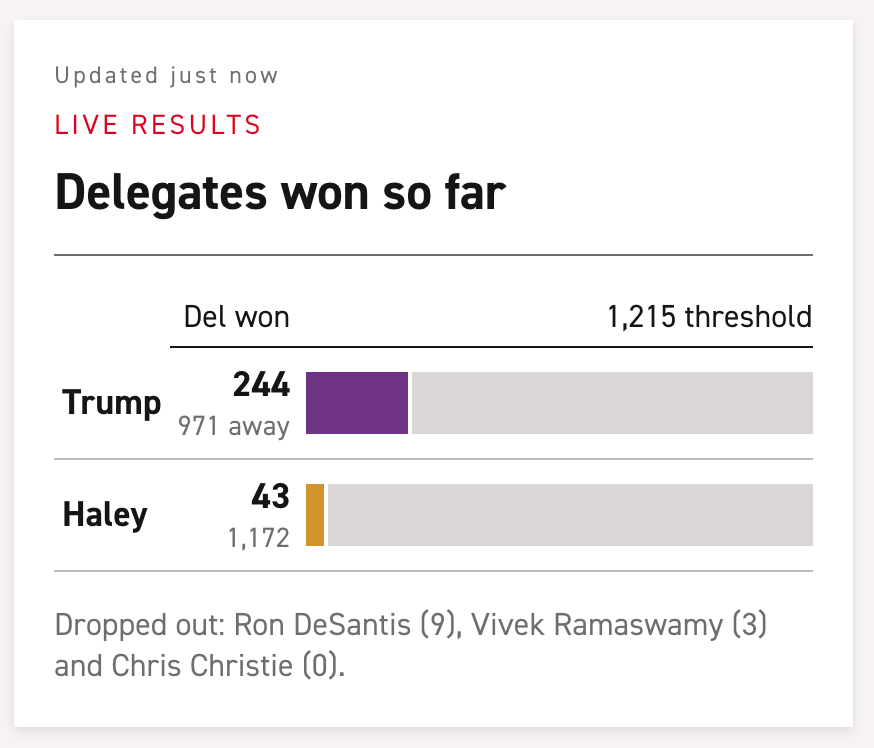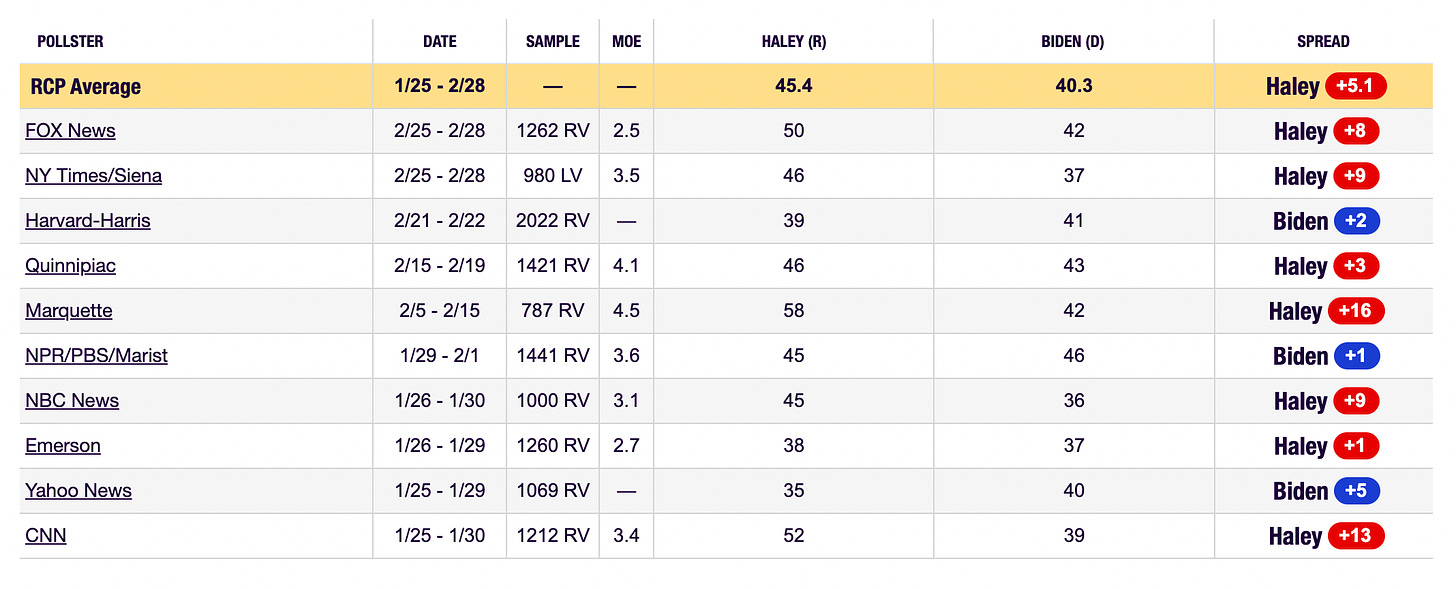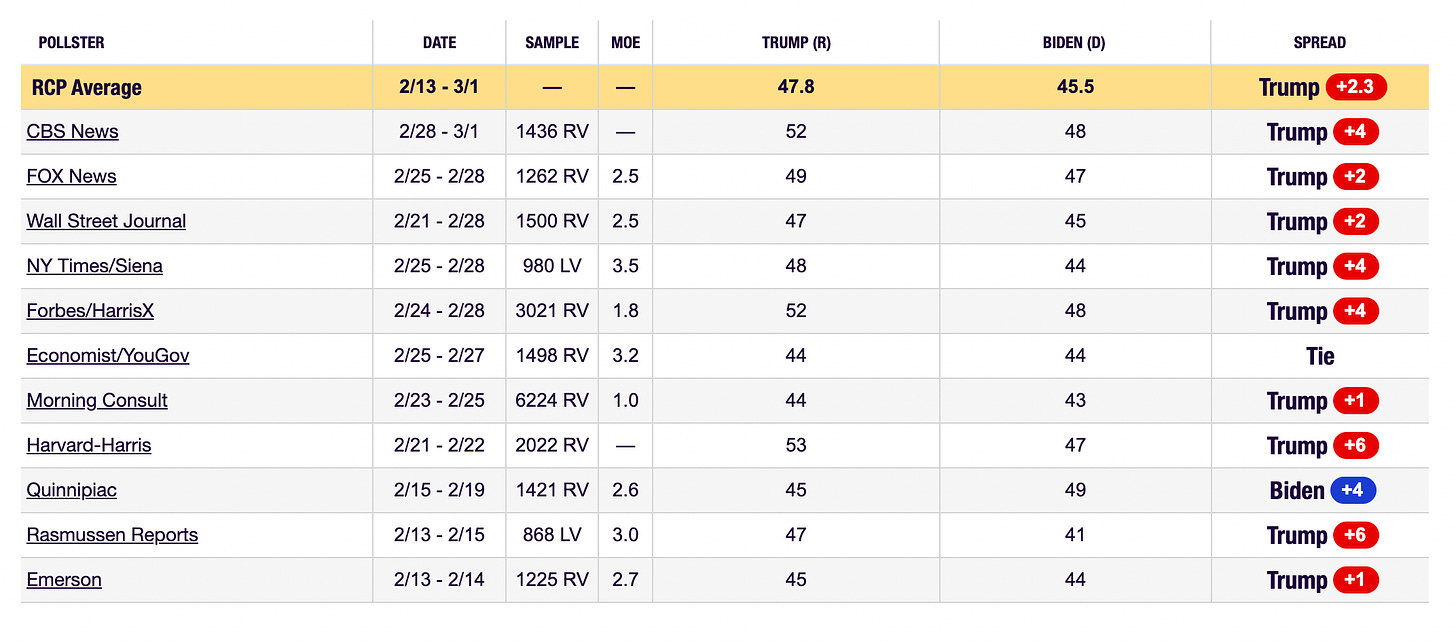A Super Tuesday Guide to All Trump’s State and Federal Cases—and There Are More Than You Realize—As Well As Critical Updates on Several Developments Likely to Impact Voters’ Votes
Super Tuesday voters deserve to know precisely what Donald Trump faces both tomorrow and in the weeks to come—as it’s exponentially more turmoil than any American political candidate has ever faced.
The first section of this report is free to read right now. You can read the whole essay for free by clicking the red button below and trying out Proof for a week.
Introduction
As America heads into Super Tuesday, Nikki Haley has just won her first primary—and in convincing fashion, getting nearly two-thirds of the vote in the Washington, D.C. Republican primary (which was only open to Republican voters) and all of the delegates awarded from the contest. She also won her first two endorsements from sitting Republican senators, both of whom represent Super Tuesday states (Susan Collins of Maine and Lisa Murkowski of Alaska). Meanwhile, a senator from another Super Tuesday state (Mitt Romney of Utah) has just announced that he will not vote for Trump under any circumstances, which is as close to a de facto endorsement of Haley as she could hope for. All in all, it’s a heck of a way for Haley to be heading into the biggest day on America’s political calendar short of Election Day itself.
While Haley recently lost financial support from—while retaining the endorsement of—a Koch-backed group, Americans for Prosperity Action, she still reported a strong February in terms of fundraising ($12 million), which, coupled with her strong January, brings her to nearly $30 million raised in just the first 60 days of 2024. Fundraising continues to be one of Haley’s strongest suits, along with avoiding the viral gaffes (if in fact they are only that) that have been plaguing the Trump presidential campaign.
Haley’s fundraising certainly compares favorably to the $50 million and counting that Donald Trump currently has in unpaid debts to his lawyers, which he’s trying to make his daughter-in-law co-chair of the Republican Party in order to start paying off using money from working-class Trump voters—something federal campaign-finance laws may not actually allow him to do.
With limited Super Tuesday polling available—pollsters tend to heavily poll the early-voting states but cut back significantly once states start voting in blocs—it’s very hard to get a handle on where Nikki Haley stands, support-wise, in Super Tuesday states.
But we know this: in the context of Trump having consistently underperformed pre-election polling in primary states by between 33% and 50% of his presumed pre-election lead, he leads Haley by only 8 in Virginia and only 17 in Massachusetts (and if the latter lead sounds significant, keep in mind that a pre-election polling lead of 20 points in neighboring New Hampshire resulted in only an 11-point victory there, so the Suffolk University poll in Massachusetts—taken well before Super Tuesday, and well before Haley’s convincing win in the Republican primary in D.C.—could well augur a single-digit race in the Bay State). Observers note, too, that another Super Tuesday state, Vermont, offers Haley an electorate much more similar to Virginia, D.C., New Hampshire, and Massachusetts than an evangelical voter-heavy state like South Carolina, and indeed Haley was already approaching a third of the vote in Vermont when it was last polled weeks ago (and Haley’s vote-share in the state rose from 19% to 31% between January 8 and February 19). Given that Trump often falsely alleges that his lead over Haley is between 60 and 70 points, it’s also worth observing that a January poll in Utah that almost certainly woefully undercounts her current strength there had her within 27 points of Trump—with Trump, notably, under 50% support—and a surprising poll in North Carolina had her close to 40% there a few weeks ago.
None of this is to say which states Haley will or won’t, or can or can’t, win come Super Tuesday. But it underscores that Donald Trump’s rhetoric, post-Michigan, about the GOP being “more united than it has ever been” doesn’t match the current reality.
In state after state, Haley has shown that she has between 25% and 45% of the GOP base: in New Hampshire, 43%; in Michigan, 27%; in Iowa, 19% (but with five since-defeated candidates still in the race); in South Carolina, 40%; and of course in D.C., a whopping 63%. And while one recent-voting state chose to hide its results by using “proxies” rather than votes to count them (Missouri), and another that just voted is so beholden to the insurrectionist cause Trump represents that Haley never stood a chance there (Idaho, where she netted only 13%, to the surprise of no one), the fact remains that Haley commanding between a quarter and a half of the GOP base isn’t actually the story of the supposedly non-competitive Republican Party primary so far.
No, the story is the staggeringly high percentage of Haley voters who say they’ll never vote for Trump.
Indeed, exit polls show that in certain states up to 60% of Haley voters will not vote for Trump no matter what, with the most common reason for this refusal being the unprecedented number of civil and criminal cases Trump is facing (and/or appealing) in state and federal courts, to include settled findings of liability for Rape, Fraud, and Defamation; pending allegations of election interference, obstruction of justice, falsifying business records, and the illegal retention of classified documents; and a litany of ancillary revelations connected to these cases involving (again) Fraud as well as Perjury and a dramatic revelation that Trump has nowhere near the amount of money he’s been telling his loyal voters for years that he has.
In all, Trump is facing 91 felony counts and (as explained below) over $625 million—not a typo—in civil judgments.
Is it any wonder that between 10% and 30% of all Republican voters are drawing a red line at supporting the man in November, making it almost impossible for him to win a general election? Certainly, conventional wisdom—given that Trump lost in 2020 by over seven million popular votes and 74 Electoral College votes—is that he’ll have to substantially increase his coalition of voters in 2024; yet every exit poll throughout the 2024 GOP primaries has shown him bleeding voters by the hundreds of thousands.
For this reason, the eve of Super Tuesday is a good time to assess the unprecedented avalanche of legal woes Trump faces as voters head to the polls in one of the biggest days of the year on the American political calendar. Voters who are understandably worried that Trump could be incarcerated in a state or federal prison by the end of this summer have a right to know if they are casting their ballot into the wind by voting for Trump on Super Tuesday, and to know (as would be almost as disturbing) if major media coverage of the race thus far has inaccurately assessed whether Nikki Haley still has a chance to win it. After all, in terms of the GOP delegates needed to win the race and the delegates actually won so far, neither Haley nor Trump is anywhere close to securing their party’s 2024 presidential nomination:

Major-media journalists presume that Trump will do well on Super Tuesday, but make this presumption exclusively based on a scant number of polls that were in most cases taken weeks before Super Tuesday, making their predictive value almost zero.
For now, what we know is that Trump has 20% of the delegates he needs to become the 2024 GOP presidential nominee, while Haley has 3.5% of the delegates needed.
We also know that it was Haley, not Trump, who won the most recent GOP primary, and that Haley is in the midst of receiving a spate of good news (not just her D.C. win but her Senate endorsements, her solid fundraising numbers, and a telling declaration of her independence in announcing that she’ll no longer commit to supporting Trump if he’s the GOP nominee). Meanwhile, Trump heads into a criminal trial on dozens of felonies in New York in just three weeks; is now caught up in a civil case in Delaware (see below) that is certain to reach at least the injunctive-relief stage in the next 17 days; and is down to the final days of his ongoing attempt to evade paying hundreds of millions of dollars in civil fines that he definitely doesn’t have the liquidity to honor.
Trump also has a criminal trial in Florida currently scheduled for May, a criminal trial in Georgia scheduled for August, and a D.C. criminal trial whose judge (Tanya Chutkan) has made clear she is willing to bring Trump to trial in September or even October, no matter how long the Supreme Court delays her case by pretending there’s doubt over whether a President of the United States has blanket immunity for crimes he commits and is therefore not an elected official but a king. (To be clear, if Trump’s argument were to succeed, it would mean President Joe Biden could cancel the 2024 election and even have his political rival assassinated without facing any criminal charges.)
It may also be worth noting that Haley consistently defeats President Biden by much more than Trump does in almost every poll. See for yourself (per Real Clear Politics):
Nikki Haley v. Joe Biden
Donald Trump v. Joe Biden
All of which raises a question so obvious that it seems bizarre anyone would deem it partisan: why is any Republican planning to vote for Donald Trump on Super Tuesday?
With significant Kremlin aid—as well as a clandestine propaganda campaign long since conceded by foreign agents hailing from Israel, Saudi Arabia, and the UAE— Trump won the presidency by a hair in 2016 (if 70,000 votes had landed differently, he would have lost the Electoral College, and he lost the popular vote by three million).
Trump then proceeded to shepherd the Republican Party to shocking losses in the midterm elections of 2018 and 2022; almost every special election held between 2016 and the present; and of course the 2020 presidential election—which he lost by over seven million popular votes and more than seventy votes in the Electoral College.
Now he’s clearly the less competitive candidate against Biden; is facing 91 felonies in four state and federal jurisdictions; has well over half a billion dollars in federal civil judgments he has no way to pay; may have to declare personal bankruptcy; may well—see below—face new civil and criminal cases in several jurisdictions; and, not for nothing, appears to be suffering more and more frequently from inexplicable mental lapses and speaking gaffes that have caused medical professionals to question both his mental health and whether he may be suffering from dementia. “#DementiaDon” now trends near-daily on Twitter, which is supposed to be a safe space for Trumpists.
Yet for all this, major media treats Donald Trump’s ascension to the GOP presidential nomination for the third consecutive election cycle—despite him never having won a popular vote—as a foregone conclusion. Could it be because journalists don’t realize that the man is facing more headwind than any political candidate in U.S. history, from his own terrible past performance as a candidate to mental health issues including sociopathy and malignant narcissism, from persistent allegations of prescription drug misuse (see here, here, here, here, and here) to third-party diagnoses of dementia, from federal criminal cases to federal civil cases, from state criminal cases to state civil cases, from business bankruptcy to personal bankruptcy, from dodgy head-to-head polling results vis-à-vis Joe Biden to a compelling Republican primary candidate he seems unable to shake, from $50 million and counting in unpaid legal fees to the possibility of a third E. Jean Carroll defamation case forthcoming (see below), from potentially disastrous civil depositions upcoming in a Delaware Chancery Court case to lingering questions about the answers he gave relating to his finances in a sworn deposition in 2022, from prospective mass defections among Haley primary voters in the 2024 general election to a prospective internal revolt at the RNC as he tries to turn an entire political party into his family’s personal piggy bank? It’s unlikely that full-time political journalists are unaware of any of this, but some Super Tuesday voters may be.
It is not too much to say that no political candidate in U.S. history has been larded down with as much baggage as Donald Trump is right now—and that’s without having yet mentioned that Trump is a significantly obese elderly man who subsists on Diet Cokes and Big Macs and gets his doctors’ reports doctored to hide from voters how bad his health is. (For that matter, who knows how many times he’s had COVID-19?)
The idea that none of this will catch up to Trump as the level of stress he faces increases exponentially in the coming weeks and months seems farcical on its face.
So will it catch up to him on Super Tuesday? Maybe, maybe not. But given voters’ right to know as much as possible about the candidates on their ballots on Super Tuesday, Proof hopes that the massive report and update on all Donald Trump’s pending cases below will be helpful to some voters. Along the way this report will consider, too, some emerging developments that have yet to flower but could also spell grave trouble for Trump. These assessments are made even more vital by a grudging acknowledgment from CNN today that the 2024 Republican Party primaries are still in their “relatively early stages”, and that the final GOP primary votes won’t be cast until June 4—three months from now (see the full GOP primary calendar at this link).
Even the New York Times—which has consistently implied in its straight-news reports that the GOP primary is already all but over—surprised its readers on Super Tuesday eve by reporting that Haley “could pick up a few more [primary wins] on Tuesday.”








